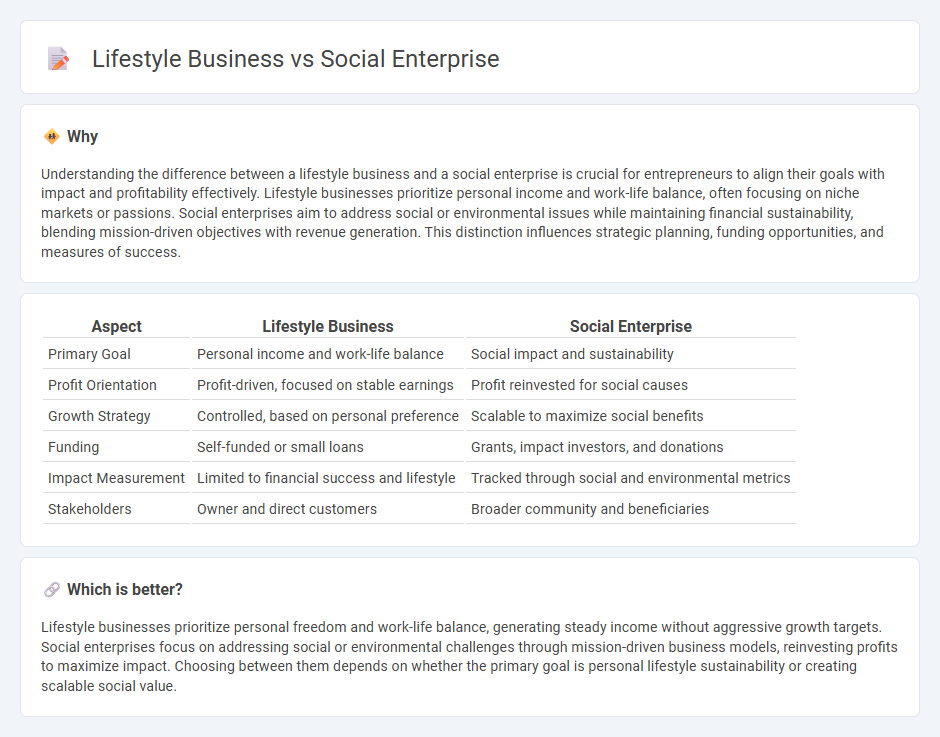
Lifestyle businesses prioritize personal freedom and work-life balance while generating steady income through niche markets or specialized services. Social enterprises focus on creating measurable social or environmental impact alongside financial sustainability by reinvesting profits into their mission. Discover more about how these two entrepreneurial approaches differ in purpose and structure.
Why it is important
Understanding the difference between a lifestyle business and a social enterprise is crucial for entrepreneurs to align their goals with impact and profitability effectively. Lifestyle businesses prioritize personal income and work-life balance, often focusing on niche markets or passions. Social enterprises aim to address social or environmental issues while maintaining financial sustainability, blending mission-driven objectives with revenue generation. This distinction influences strategic planning, funding opportunities, and measures of success.
Comparison Table
| Aspect | Lifestyle Business | Social Enterprise |
|---|---|---|
| Primary Goal | Personal income and work-life balance | Social impact and sustainability |
| Profit Orientation | Profit-driven, focused on stable earnings | Profit reinvested for social causes |
| Growth Strategy | Controlled, based on personal preference | Scalable to maximize social benefits |
| Funding | Self-funded or small loans | Grants, impact investors, and donations |
| Impact Measurement | Limited to financial success and lifestyle | Tracked through social and environmental metrics |
| Stakeholders | Owner and direct customers | Broader community and beneficiaries |
Which is better?
Lifestyle businesses prioritize personal freedom and work-life balance, generating steady income without aggressive growth targets. Social enterprises focus on addressing social or environmental challenges through mission-driven business models, reinvesting profits to maximize impact. Choosing between them depends on whether the primary goal is personal lifestyle sustainability or creating scalable social value.
Connection
Lifestyle businesses and social enterprises are connected through their shared emphasis on aligning business goals with personal or societal values rather than solely focusing on profit maximization. Both models prioritize sustainable impact, whether by enhancing an entrepreneur's quality of life or addressing social issues, utilizing innovation and community engagement as core strategies. Entrepreneurs in these domains leverage their ventures to create meaningful change, balancing financial stability with ethical and social responsibility.
Key Terms
**Social Enterprise:**
Social enterprises prioritize creating measurable social or environmental impact while sustaining financial viability, often reinvesting profits to further their mission. These organizations integrate social goals into their core business models, distinguishing themselves from lifestyle businesses that typically prioritize personal income and flexible working conditions. Explore deeper insights into how social enterprises balance purpose and profit for transformative change.
Social impact
Social enterprises prioritize creating measurable social impact through sustainable business models, often reinvesting profits to address societal challenges such as poverty, education, or environmental issues. Lifestyle businesses focus primarily on personal goals like financial independence and work-life balance, typically targeting niche markets without necessarily aiming for broad social change. Discover how aligning your business with social impact can drive meaningful community transformation and sustainable growth.
Mission-driven
Social enterprises prioritize creating positive social or environmental impact alongside financial sustainability, integrating mission-driven goals into their core business strategies. Lifestyle businesses primarily focus on personal satisfaction, work-life balance, and steady income, with less emphasis on broad social change. Explore the key differences to understand which model aligns best with your values and objectives.
Source and External Links
Social enterprise - A social enterprise is an organization that uses commercial strategies to maximize social, financial, and environmental well-being, embedding social goals in their operations and reinvesting profits to further their mission without relying solely on philanthropy.
What is a Social Enterprise? - Definition & Examples - Social enterprises prioritize social or environmental goals over profit, operate like businesses but reinvest profits to sustain missions addressing social issues such as affordable housing and employment for vulnerable populations.
14 Social Enterprises & Examples: How They Impact the ... - Social enterprises use business methods intentionally to tackle social problems, improve communities, or the environment, reinvesting profits and providing innovative services like employment for disadvantaged groups or eco-friendly products.
 dowidth.com
dowidth.com